November 2022
Shut It Down – Picket Lines Mean Don’t Cross!
All Out to Win the UC-Wide
Student Workers Strike!
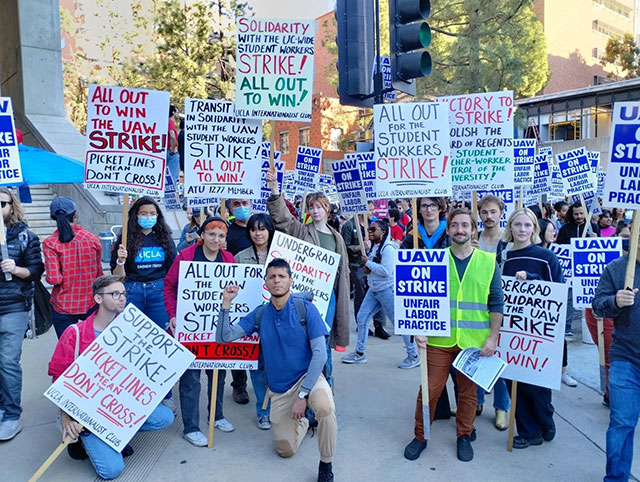
UCLA Internationalist Club with striking student workers on the first day of the UC-wide strike, November 14. (Internationalist photo)
LOS ANGELES, November 19 – As it is about to enter its second week, the strike at the University of California is shaping up as a test of strength between determined strikers and high-handed bosses, with implications for labor and campus struggles across the country.
The streets echoed with the chant of “Shut it down!” as thousands of striking student workers at the University of California, Los Angeles (UCLA) marched on Monday as part of the launch of the strike here and at the nine other UC campuses across the state.1 With 48,000 on strike from UC Davis in the north down to UC San Diego in the south of the state, this is the biggest strike this year in the United States – and the largest higher education strike in U.S. history. The latest in a series of academic workers’ strikes (including last year’s victory at Columbia University), the battle at UC comes amidst growing discontent in key sectors of U.S. labor, together with organizing efforts at Amazon and the prospect of a nationwide UPS Teamster strike next year. Key to the potential for a major scale labor upsurge is the fight for a class-struggle program and leadership.
The University of California strikers – including teaching assistants, tutors, graduate and postdoctoral researchers, and others, organized by the United Auto Workers (UAW) in four bargaining units – are fighting against poverty wages and enormous rent burdens to live in the expensive cities where they work. According to union surveys, 92% of graduate workers are “rent-burdened,” meaning that they pay over 30% of their income for rent. Given the meagerness of those incomes, the strikers’ demands include a big raise in order just to make ends meet (to a base salary of $54,000 for grad student workers – many now make less than half that), $2,000/month reimbursement for childcare and other key demands. The response of the UC administration has been – and continues to be – to try to stonewall them, in the hopes of wearing them down. By the time the strike broke out four days ago, the union members were fighting mad, as shown in the 98% vote to authorize the strike, as noted in the UCLA Internationalist Club leaflet reprinted below.
Building up to the strike, Internationalist activists organized and agitated to help win undergrad support for and participation in the impending struggle. In addition to tabling and leafleting, this included the UCLA Internationalist Club’s forum on lessons of last year’s Columbia strike (addressed via Zoom by one of that strike’s central leaders), a film showing of With Babies and Banners, the classic documentary on the role of the militant Women’s Emergency Brigade in the UAW’s sit-down strikes in the ’30s, and other activities. Given that for decades, the U.S. labor bureaucracy’s work for the Democratic Party has included undermining the very meaning of picket lines – don’t cross – a basic part of our message has been the need for mass pickets to completely shut down all work and classes – all classes, including online – on the struck campuses.
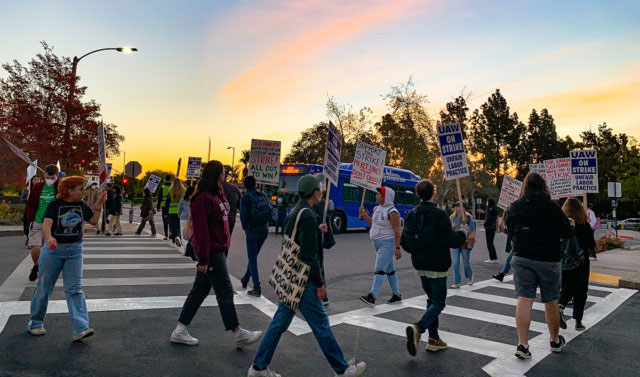
“No work today at UCLA!” UAW strikers and Internationalist Club supporters on early Thursday morning picket line honored by construction workers who refused to work on campus in solidarity with the strike. (Photo: Constanza Montemayor / Daily Bruin)
Pickets and marches of hundreds of strikers have taken up the chant, “Picket lines mean don’t cross!” Some of this has been coming together in efforts like blocking some on-campus transport, stopping trucks, etc. And on a large ungated campus like UCLA, shutting down key buildings with mass pickets could play a significant role in bringing the arrogant UC bosses to their knees. In an academic strike, in addition to being a basic expression of working-class solidarity, bringing in other sectors of labor is particularly essential, as this is a matter of power – the power to shut it all down.
Efforts by union militants and Internationalist Club supporters to appeal for labor solidarity among other workers at UCLA have made important headway. One ironworker told us: “If you set up picket lines, we will honor them. We don’t work behind picket lines.” And they stood by their word. As soon as UAW picket lines were set up outside a key construction site, workers in a range of unions stopped work in solidarity with the strike – including Ironworkers Local 433, Plumbers and Pipefitters Locals 78 and 761, Sheet Metal Workers Local 105, Laborers Local 300. With strikers cheering and welcoming them onto the picket lines, the chant broke out: “No work today at UCLA!” Halting the timelines of multimillion-dollar construction projects is sure to hit the UC administration where it hurts. This needs to spread UC-wide.
At UC Berkeley, workers in a number of unions have also respected the picket lines and shut down construction work on campus in solidarity with the strike. Teamster delivery drivers statewide have gotten authorization from their union to refuse to make any deliveries to struck UC campuses. One Teamster driver announced to a picket line at UC Berkeley that he was refusing to deliver over 100 packages, adding “We’re in the same fight.” Meanwhile, unions representing other sectors of the UC workforce must respect the picket lines and stop work now. Divide and conquer is the bosses’ strategy – workers must stand together to win.
An indication of the widespread support for the strike is that even an editorial in the UC Berkeley student paper, the Daily Californian (11 November), stated: “First, and most importantly, we are urging students to not cross picket lines to attend class.” Yes – and any and all classes must be cancelled completely as part of the fight to turn “shut it down” from a chant into a reality on each campus and throughout the UC system. No more palaver about “soft” (porous) picket lines – each and every picket line means don’t cross. It’s the battle line of the class war. Many UC strikers are inspired by the example of Columbia – in the ten-week strike there, the struggle to turn “Shut It Down” from a chant into a reality was decisive.2
Meanwhile, this week the UC administration claimed it could not conduct negotiations with the striking workers on the ridiculous excuse that it did not have the “space.” In response, striking workers found some empty tables, set them up in large open spaces on the campuses and chanted “We got space, show your face!”
Reprinted below is a leaflet put out by the UCLA Internationalist Club on the eve of the strike to help mobilize support and advance the type of militant, class-struggle program needed to bring it to victory.
-----------
UCLA Internationalist Club Statement of Class-Struggle Solidarity
Victory to the UC-Wide Student
Workers Strike – All Out to Win!
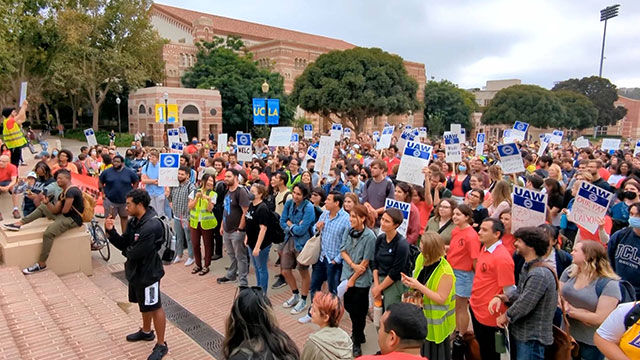
October 12, UCLA, mass meeting of UCLA student workers to call for a strike authorization vote. (Photo: UAW)
We say: “No Work, No Class, Shut It Down!” – The UCLA Internationalist Club is helping mobilize students and workers in support of the UC-wide strike starting on November 14 called by academic student workers organized in the UAW. Rank-and-file motivation to fight back flows from the desperate situation of student workers and other campus workers who are essential to making the university run, but receive only poverty pay.
The week before last, with almost 37,000 UC academic student employees statewide voting, 98% voted in favor of striking in what was the largest and most decisive strike vote of academic workers in U.S. history. Amid the backdrop of runaway inflation and skyrocketing rent, UC teaching assistants, postdocs, and student researchers are striking for a cost-of-living adjustment which would include an initial wage increase to reduce the rent burden faced by grad students to an average of less than one-third of income spent on rent, as opposed to the current average of two-thirds UC-wide and three-quarters (!) in Los Angeles.
Academic workers organized in UAW do most of the teaching and research work across the UC system, but the most common salary they receive is less than 3% of the salary of the UC president ($23,247 vs. $890,000). To put this into perspective, the government considers low income in Los Angeles to be $66,000, while UC grad workers are typically only paid close to one-third of that amount. Meanwhile, the UC administration has the nerve to claim it can’t pay up while it sits on a $19 billion endowment and grew its assets by $38 billion in just the first half of 2021.
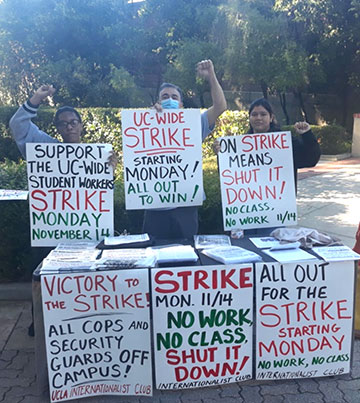 Supporters of the UCLA
Internationalist Club
Supporters of the UCLA
Internationalist Clubhelping to mobilize in the lead-up to the UC-wide strike of student workers, November 10. (Internationalist photo)
To defeat the anti-union administration and its ruling-class godfathers, it is not enough to be right and have justice on your side – it’s a question of power. On strike means shut it down. All classes should be stopped, and students brought out en masse to the pickets and rallies. Moreover, as shown in one strike after another by grad students, TAs, adjuncts and others across the country, for university strikes to win, all sectors of the campus workforce need to unite in genuine solidarity – one out, all out. Picket lines mean don’t cross!
The Student Workers of Columbia won after waging the longest higher education strike in over a decade, and one of the largest recent strikes in the U.S. From November 2021 to January 2022, they held out on picket lines and escalated the struggle, successfully winning their first contract, which was the first anywhere in the U.S. to win recognition of union representation for all undergrad teaching and course assistants, together with grad student workers. They won significant improvements in pay, health and childcare, measures against discrimination and harassment and other demands.
The Internationalist Clubs at the City University of New York were very involved in mobilizing support for the Columbia strike and in helping raise the class- struggle consciousness needed to win it. It was on the picket lines that these gains were won, and the fight to put “picket lines mean don’t cross” into practice played a crucial role. Sell-out union bureaucrats often call for “informational” picket lines – a contradiction in terms which teaches people that it’s supposedly “OK” to cross picket lines. But as hundreds of Columbia strikers linked hands in large pickets, blocking entrances and chanting “picket lines mean don’t cross,” the point was highlighted that once a strike has been collectively decided on, everyone must respect the lines.
To counter the administration’s divide-and- conquer strategy of dividing university employees into various separate unions with different contract expiration dates, we call for uniting everyone who works on campus into a single union of all university employees. This would clearly not include administrators, campus cops and other enforcers for the employer. Strikers must demand all cops and security guards off campus! They are the fist of capitalist “law and order” used to try to break strikes. We in the UCLA Internationalist Club further call to abolish the Board of Regents and fight for student/teacher/worker control of the university.
Since the ruling class can go quite a while without college papers being graded (whereas a transport strike, for example, can shut things down tight in a day), bringing in active support from other sectors – and large numbers of students – is doubly important.
Reliance on capitalist politicians – instead of the militant mass mobilization of workers power – has brought defeat to all too many strikes and labor struggles. As revolutionary Marxists, we call to break from the Democrats and all capitalist parties and politicians, and to build a class-struggle workers party to fight for a workers government. Then, like the rest of the wealth coined from the labor of the workers and oppressed, the universities will be put at the service of the needs of all, as part of a socialist revolution here and around the world.
All out to win – Picket lines mean don’t cross!
Lessons of the 2020 COLA Strike (Reprint)
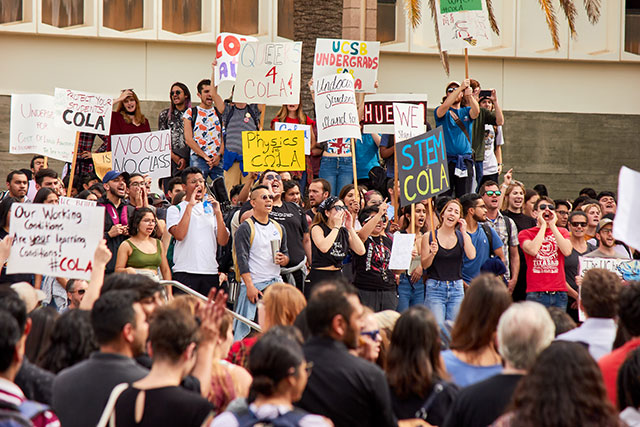
Rally at UC Santa Barbara during coordinated protests and strike actions on University of California campuses in solidarity with the UC Santa Cruz graduate student workers, March 2020. (Photo: Daily Nexus)
Key issues relevant to the current strike were addressed in a leaflet issued during the graduate student workers strike in 2020, advocating a militant, class- struggle program to win. Many of the issues posed then have continued to come up, again and again, in struggles by grad students, adjuncts and others across the country and are posed today in the fight to win the current UC- wide student workers strike. Below is a reprint of “A Militant Program to Win UC Grad Student Workers Strike” (March 2020):
4 MARCH 2020 – For months, graduate student workers across the University of California have been demanding a cost-of-living adjustment (COLA) of $1,412 a month to offset skyrocketing rents. Since December, grad students at UC Santa Cruz have withheld grades, and beginning in early February they have been on strike. The walkout is a wildcat, as the leadership of the statewide union, UAW Local 2865, representing 19,000 student workers in the UC system, has refused to authorize it. The UC administration has treated the strikers’ demands with disdain.
Early on, UC president Janet Napolitano sent riot cops from across the university to brutally beat strikers and their supporters, arresting 17. Then on February 28, some 54 Santa Cruz grad student workers received letters of termination. Twenty are immigrant students, whose immigration status is at risk and who could face deportation. Another 26 have been barred from spring appointments. This unyielding hard line is no surprise coming from Napolitano, who was head of Homeland Security – boss of the I.C.E. immigration police – in the administration of Democrat “Deporter-in-Chief” Barack Obama.
Across California, students, teachers and others face astronomical housing costs. In Santa Cruz, the average rental unit goes for $2,600 a month, far more than what grad student workers make. Support for strike action has been building, and the firing of 82 teaching assistants sent waves of anger around the UC system. The day before, as UCSC strikers defied a Napolitano ultimatum (“Doomsday 2.0”), 200 grad students at UC Santa Barbara went on a full teaching strike, and on the 28th over 2,000 came out at USB in solidarity with UCSC. At UCLA, UC Berkeley and elsewhere there were angry protests.
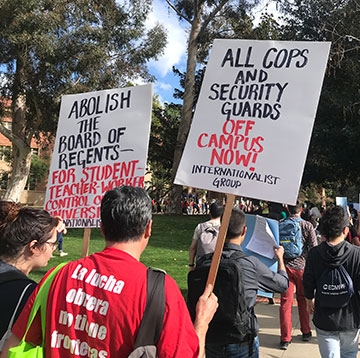 Revolutionary
Internationalist Youth and Internationalist Group at 21
February 2020 UCLA solidarity protest. (Internationalist photo)
Revolutionary
Internationalist Youth and Internationalist Group at 21
February 2020 UCLA solidarity protest. (Internationalist photo)Now a statewide action has been called for Thursday, March 5 to “Shut Down UC.” At a UCLA assembly Monday, student workers voted overwhelmingly to strike. It is urgent that this be as solid and widespread as possible. Meanwhile, the UAW 2865 leadership – after letting Santa Cruz strikers hang, saying it was bound by the “no strike” clause of the contract (which it negotiated and 83% of UCSC members opposed) – has called a membership vote on a statewide “unfair labor practices” strike over the UC bosses’ refusal to bargain with it. But while citing the firings, the ULP charges do not specify that they must be rescinded.
Clearly, the UC administration and its draconian tactics are a threat to all students, teachers and workers at the university. Militant strike action is needed to literally “shut it down.” The question is how.
We Internationalists have sought to build support for UC grad student workers. Class Struggle Education Workers put out a solidarity statement (available online at: http://edworkersunite.blogspot.com/?q=uC+grad) and CSEW supporters traveled to Santa Cruz, joining pickets and speaking at a general assembly. At UCLA, Revolutionary Internationalist Youth and Internationalist Group supporters have been active in protests. Here we wish to put forward a program to win a strike.
- SPREAD THE STRIKE to every corner of the UC system. Every UC school has some level of organizing for the COLA demand, but it varies from campus to campus. A solid UC- wide strike is crucial, now. Demands should include regular adjustment for inflation and no reprisals.
- BUILD MASS PICKET LINES THAT NO ONE CROSSES. Even when UCSC picketers closed the main entrance on March 2, people were directed to the second entrance to enter the struck campus! Strike means strike, and picket lines mean “don’t cross,” period!
- Appeal for SOLIDARITY ACTION BY FULL-TIME FACULTY, CAMPUS WORKERS AND OTHER WORKERS. Obviously, professors must refuse to teach. Santa Cruz city bus drivers have respected UCSC picket lines. As a UCSC striker remarked about a strike at another university, “the strike won when the municipal garbage workers joined the strike.”
- Strikers must demand ALL COPS AND SECURITY GUARDS OFF CAMPUS. They are the fist of capitalist "law and order," and (as we have seen) will be used by former U.S. top cop Napolitano to try to break any strike.
- A STATEWIDE ELECTED UNION STRIKE COMMITTEE should be formed, with delegates from every campus, who can be recalled at any time. UAW bureaucrats have opposed the UCSC wildcat and other strike action, and can be counted on to undercut even a “ULP strike” that they call. But the bureaucracy is not the union, the membership is!
A wildcat strike can be a spark for necessary labor action, but it is no substitute for a united, massive mobilization of the union ranks. Grad strikers must not be counterposed to the union, but instead should organize to take control of a strike out of the hands of the sellout bureaucrats.
What’s needed to actually win a strike is to mobilize working-class power. If dock workers, transport workers and others took action, would-be union-buster Napolitano would fail, and likely fall. RIY and CSEW call to abolish the Board of Regents and institute student/teacher/worker control of the university.
That means fighting politically, above all breaking with the Democratic Party. Janet Napolitano is a Democrat. So are California governor Gavin Newsom and the majority of both houses of the state legislature, who prepared and voted a state budget based on poverty pay for student workers and other “contingent” employees, who can be fired at any time, as we just saw.
So Democratic presidential hopeful Bernie Sanders offers a statement of empty support for the UCSC strike, but the bosses of the education system and the political system at every level in California are Democrats … as are the union tops. What’s needed is a fighting union leadership built on a program to win the class struggle. This includes breaking with all capitalist parties, not only Democrats and Republicans, but also minor ones like the Greens – to forge a revolutionary workers party to put an end to capitalist exploitation. ■
- 1. See a short video of this at: https://www.youtube.com/watch?v=iYo-xHk29ww
- 2. See “ Columbia Strike Wins, More Struggles Ahead,” Class Struggle Education Workers, 26 January 2021
